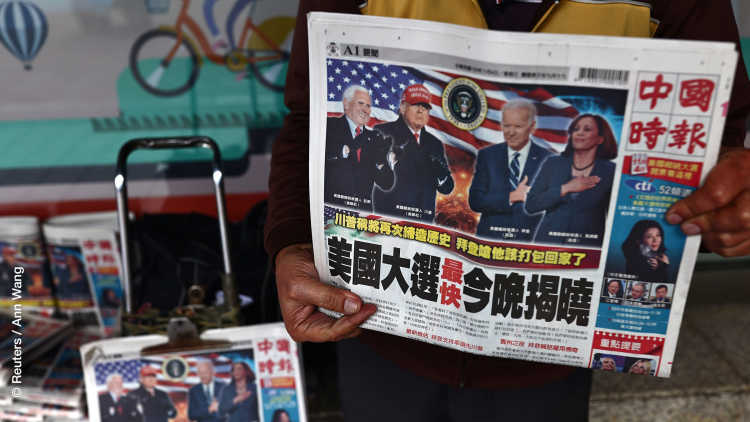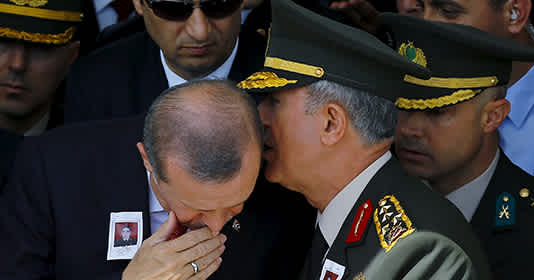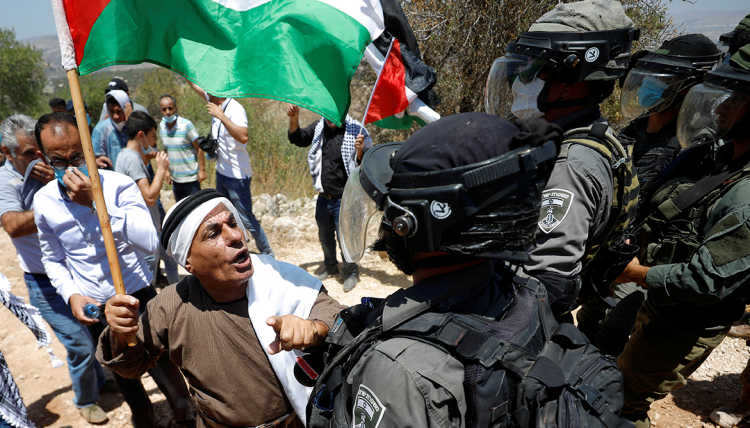- Home
- Publications
- GIGA Focus
- Biden’s Challenge: Kurdish Autonomy and Turkish Expansionism
GIGA Focus Middle East
Biden’s Challenge: Kurdish Autonomy and Turkish Expansionism
Number 1 | 2021 | ISSN: 1862-3611

The United States wants to end “forever wars” in the Middle East, among them the war against ISIS in Syria and Iraq. Much to Turkey’s dismay, Kurdish forces were crucial on-the-ground allies in that pursuit. While the military battle is subsiding, the question has arisen of how the new US administration will politically approach its Kurdish allies and deal with Turkey’s expansionism in the future.
Turkish expansionism worries the European Union and United States, despite it having been facilitated by them in the past: Both entities allowed Turkish president Erdoğan to expand militarily into Kurdish areas in Syria and Iraq without any political repercussions from his Western allies. Therefore, a currently untamed and unilaterally acting Turkey will be one of Biden’s greatest challenges in the region.
Biden will campaign for an end to endless wars, as Trump did, but he also knows that an abrupt withdrawal of US forces is not a solution. Rather, a comprehensive post-war structure for Syria must be drafted, in which the Syrian Democratic Forces should play a crucial role. The main obstacle to such an encompassing agreement will be Turkey.
The Kurdistan Region of Iraq represents a historical precedent that should not be copied. Since 2016, Turkey has increasingly and repeatedly targeted civilians there, even though the region’s Kurdish administration formally cooperates with Turkey. The short-sighted approach that the United States took vis-à-vis the Iraqi Kurds – only granting them autonomy if they agree to act as a proxy force for Turkey – has enabled this.
Joe Biden as well as his secretaries of state and of defense, respectively Antony Blinken and Lloyd Austin, have much experience on the Kurdish question and, to some extent, strong pro-Kurdish records. They will likely push for a compromise between Kurdish actors and Turkey in the time to come.
Policy Implications
To achieve long-lasting stability concerning the Kurdish question, Biden’s administration should design policies that aim to prevent Turkish unilateralism and facilitate peace talks between Ankara and especially the PKK leadership, in cooperation with partners in the European Union. Furthermore, the political recognition of the Kurds in Syria is central to defending the gains made against ISIS.
Past US Policies between the Kurds and Turkey
There is unquestionably a great sense of “war fatigue” in the United States, with bipartisan support for the notion that “forever wars” must end. However, when in October 2019 then-president Donald Trump ordered the sudden withdrawal of US forces from Kurdish-ruled northeastern Syria, where since 2014 the fight against the so-called Islamic State of Iraq and Syria (ISIS) had been spearheaded, shock and anger were expressed by politicians such as Joe Biden, Nancy Pelosi, and even staunch Trump supporters – for example, Lindsey Graham. Donald Trump turned his back on his Kurdish allies of the Syrian Democratic Forces (SDF) and provided an opening for Turkey, which went on to attack the Autonomous Administration of North and East Syria (AANES, also known as Rojava) just hours after Trump’s announcement. One of the only places where US involvement seemed to have some positive effect in fighting terrorism was abandoned.
One politician who had very clear words for what he felt about Trump’s sudden move was Joe Biden, who on 20 January of this year was sworn in as the new US president. On 16 October 2019, just a week after Trump had ordered the withdrawal of US troops, Biden made the following statement at a campaign stop in Iowa: “Our commanders across the board, former and present, are ashamed of what’s happening here. […] Turkey is the real problem here. And I would be having a real locked-down conversation with Erdoğan and letting him know that he’s gonna pay a heavy price for what he has done. Now. Pay that price” (Biden 2019).
War fatigue aside, the happenings of October 2019 showed two things: First, an uncalculated withdrawal of US troops can undo any success had over years of fighting terrorism in the Middle East. Second, NATO partner Turkey and its unilateral interventionism pose an emerging threat. More specifically, in Syria and Iraq, Turkey prioritises the fight against independent Kurdish self-rule over anything else, even demonstrating its willingness to put at risk what was achieved in six years of containing ISIS. Behind this is Ankara’s intransigence towards the Kurdistan Workers’ Party (Partîya Karkerên Kurdistanê, PKK), which has weakened the US-led coalition’s fight against ISIS. Turkey’s unilateral military actions in both Syria and Iraq also pose a threat to the region at large and are pushing the AANES into an ever-growing humanitarian crisis.
With Joe Biden as the new US president, the question emerges of whether he and his cabinet will approach President Erdoğan as forcefully as he promised during his campaign. Essentially, the new US administration will have to deal with an unpredictably behaving NATO ally (Turkey) on the one hand and the United States’ only on-the-ground Kurdish ally in Syria (the SDF) on the other. This year will likely see an additional escalation of the conflict in northern Syria; what Biden’s presidency will need with regard to Turkey as the greatest obstacle is a clear strategy.
Why the West Tolerates Turkey’s Expansionism
Currently, Turkey is active in a record number of military conflicts in Europe, the Middle East, and beyond. Turkey is militarily engaged in the Eastern Mediterranean, Nagorno-Karabakh, Cyprus, Libya, Syria, and specifically in Kurdish-ruled areas of Iraq and Syria. Turkey has been acting more and more unilaterally and without coordination with its NATO partners, its purchase of Russian S-400s marking just one of many escalations in this regard. Further, the Eastern Mediterranean crisis deepened in 2020, creating more pressure among European Union countries such as Greece, Cyprus, and France to more strongly oppose Turkey’s foreign policy. In the war between Armenia and Azerbaijan over Nagorno-Karabakh, which started in fall 2020, Turkey sided with the latter. As clearly as this growing Turkish expansionism has emerged, as reluctant have the EU and the US become to counter these ambitions. Their approach towards Turkey, a country that joined NATO as early as 1952, has been one of appeasement.
The current reluctance towards Turkey has three different dimensions: First, the EU cannot exert pressure on Turkey even if it would like to, because of several dependencies. On one side, there is Germany, an old partner to Turkey in the EU that will veto any attempt by EU states to sanction the country. Germany has repeatedly backed Turkey in internal EU negotiations. The EU is further guided by the refugee deal of 2016, by which Turkey has agreed to keep migrants from entering Greece in exchange for financial aid and concessions on visa-free travel for Turkish citizens to the EU. Second, pressure on Turkey has never been exerted thoroughly by the West, since it has been too important of an ally to be marginalised. Not even three military coups from 1960 to 1980 have remotely changed Turkey’s status. It seems that whatever regime has ruled Turkey it has never bothered the West, as long as geostrategic allyships were kept intact. Third, the strategic partnership with the US became much more personalised in the face of Donald Trump’s presidency. On top of the aforementioned geopolitical dependencies, Trump’s presidency brought in the factor of his own private business relationships to Ankara. Although the Special Counsel investigation against Trump focused on Russia, the role of Turkish meddling with figures of the Trump administration as well as with his private businesses cannot be underestimated when examining these policy decisions (Kirkpatrick and Lipton 2019).
In Donald Trump’s continuing to appeasement of Turkey, he went so far as to abandon the United States’ only on-the-ground ally against ISIS, the SDF, in October 2019 by withdrawing US troops from northeastern Syria. The Turkish invasion that followed just minutes after Trump’s announcement can therefore be considered the product of years of reluctance, both by the EU and the US, to check Turkey; this reluctance is based on long-held geostrategic considerations and has more recently been fortified by private business ties. This path dependency has immense repercussions for the people in the region and the fight against ISIS.
As Figure 1 shows, between October and November 2019, the Turkish invasion spread over the whole northern sphere of the AANES, focusing not only on strategic positions but also on densely populated areas. This made Operation Peace Spring, as it was named by Turkey, not only one of the deadliest Turkish operations in Syria, but also one with the biggest infrastructural and humanitarian repercussions. It led to more than 1,000 deaths, 200,000 displaced individuals, and a humanitarian crisis that is worsening every day (Balanche 2020). During the Turkish advance, many imprisoned ISIS fighters escaped SDF prisons: since SDF forces were busy fighting against the Turkish military, dozens of these Islamist fighters were able to flee, which significantly strengthened the ISIS presence in rural Syria afterwards (Khalifa 2020). Furthermore, the Syrian National Army (SNA), which carried out the ground offensive on behalf of Turkey, has been known to host Islamists in their ranks, committing human rights abuses, and practising targeted violence against minorities and women. On the humanitarian and infrastructural level, Turkish involvement also had major repercussions. Turkey, for example, has repeatedly cut off water from the Alouk water station, which provides drinking water for the Hasaka area, where thousands of internally displaced persons reside. Turkey has also not allowed NGOs or humanitarian organisations to cross the border to AANES through Turkey, endangering the livelihoods of millions (O’Donnell, Klimov, and Barr 2020).
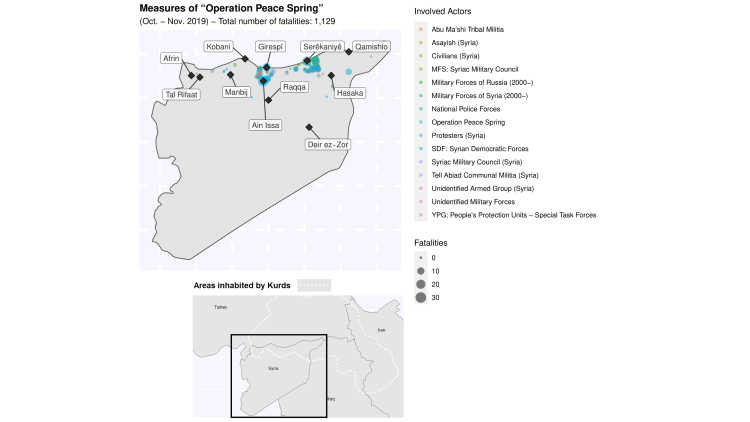
From Military to Political Recognition of the Kurds
The military confrontation in Syria is largely over, and the post-war structure of the country is something that must be tackled internationally, no matter the level of war fatigue. Turkey, however, has denied the SDF any political, diplomatic, and hence post-conflict recognition and has for years blocked its representation in multilateral talks, accusing the SDF of terrorism and support for the PKK. Standard analyses suggest that the solution is therefore in the hands of the SDF (e.g. Khalifa 2020). These analyses propose that if the SDF were to distance itself more forcefully from the PKK, Turkey could be calmed. That advice is, however, misleading and fails to consider two central characteristics that highlight that this conflict is not only between the SDF and Turkey but contains a transnational dimension that demands a comprehensive resolution.
First, nothing can be done to defend against the PKK accusation as long as Turkey uses it as a political instrument; it has proven an infinitely stretchable claim for the country. It is this political character of the claim that shows how indispensable a resolution to the conflict is. After the peace talks with jailed PKK founder Abdullah Öcalan that began in 2013, Turkey claimed to be open to a political solution to the Kurdish conflict. Both sides agreed to support the parliamentary participation of the Peoples’ Democratic Party (Halkların Demokratik Partisi, HDP), and the PKK agreed to call a ceasefire and retreat out of Turkey into the Kandil Mountains in the Kurdistan Region of Iraq (KRI). As soon as Erdoğan and his Justice and Development Party (Adalet ve Kalkınma Partisi, AKP) lost the absolute majority in the wake of high turnout for the HDP in the 2015 elections, and violent conflict restarted in various cities in southeastern Turkey, the Turkish government not only called off further peace talks with the PKK but even claimed that none had ever happened. A large segment of the thousands of HDP MPs and regional politicians that have been arrested in recent years have specifically been accused of having links to the PKK. The PKK accusation is therefore not exclusively a claim made towards the SDF for having alleged direct links to the outlawed group, but it has been a political instrument used for decades to repress oppositional groups and parties, minorities, figures from civil society, and journalists. It is therefore a political accusation from which no one can clear themselves.
The second important aspect that evinces the transnational dimension of the conflict is the fact that Kurdish parties distancing themselves from the PKK has proven insufficient to achieve peace with Turkey, as developments in northern Iraq have demonstrated. The KRI became a de facto autonomous region under Kurdish rule as early as 1991, directly after the Second Gulf War. In 1992 then-Iraqi president Saddam Hussein agreed to allow Turkey to enter Iraqi air space in its war against the PKK. According to the US-mediated 1998 Ankara Statement and the Washington Agreement, one of the key concessions that the ruling Patriotic Union of Kurdistan (Yekîtiya Nîştimanî ya Kurdistanê, PUK) and the Kurdistan Democratic Party (Partiya Demokrat a Kurdistanê, KDP) in Iraq had to make was to specifically help Turkey in its fight against the PKK. Consequently, the conflict between Turkey and the PKK spread into the KRI with full legitimisation from Erbil and Baghdad. The conflict effectively relocated from southeastern Turkey, where a lot of fighting occurred in urban areas, to the border area of the KRI from 2016 onwards, as the analysis by the International Crisis Group (2020) shows. As Figure 2 confirms, this development has not changed since, and violent conflict between the Turkish state and the PKK is continuing in the KRI, claiming the highest number of Turkey–PKK conflict-related casualties. This shows that the violent struggle – in opposition to one of the ideas behind the Washington Agreement – has not found a military solution. More importantly, KRI concessions to Turkey have merely relocated arenas of violence, with potential for further escalation in 2021. Research by the Kurdistan Times news site shows how concrete this potential actually is. It reveals that the costs of the fight against the PKK with the help of the KRI are for the first time ever included as part of Turkey's official defence budget in 2021. In the document, the president of the KRI, Masrour Barzani, as well as the Iraqi prime minister, Mustafa al-Kadhimi, are also said to have allowed Turkish military operations against the PKK in the vast areas of northern Iraq, even beyond the KRI. This includes not only the classic areas of operation of the PKK in the Kandil Mountains, but also ones such as Sinjar and Makhmour, where thousands of civilians live (Kurdistan Times 2021).
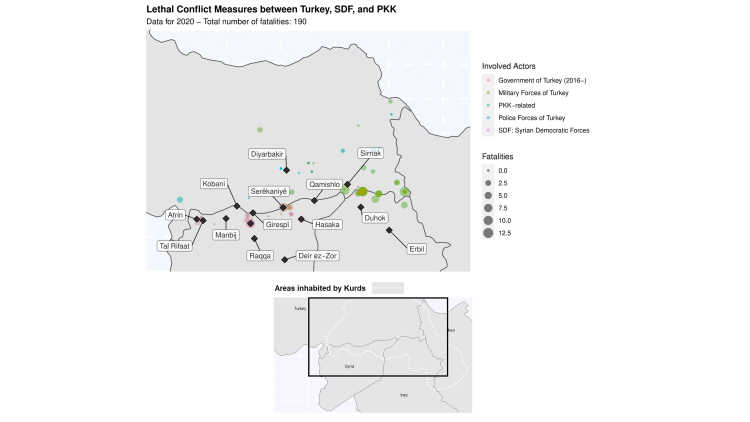
Unlike a number of observers suggest, the conflict today is not happening in the KRI’s periphery alone, but it is perceived by civilians across northern Iraq as an active threat. The latest Arab Barometer data suggest that Turkey’s military intrusion into northern Iraq is clearly present in civilian political perception. As shown in Table 1, most citizens from the KRI governorates believe Turkey is the country posing the greatest threat to its political stability or well-being. The fact that this threat is specifically targeted towards Kurds is evident in the comparison with the perception of respondents from the remaining Iraqi governorates in which exclusively Arab majorities live. Here, only 1 per cent perceived Turkey to be the greatest threat.
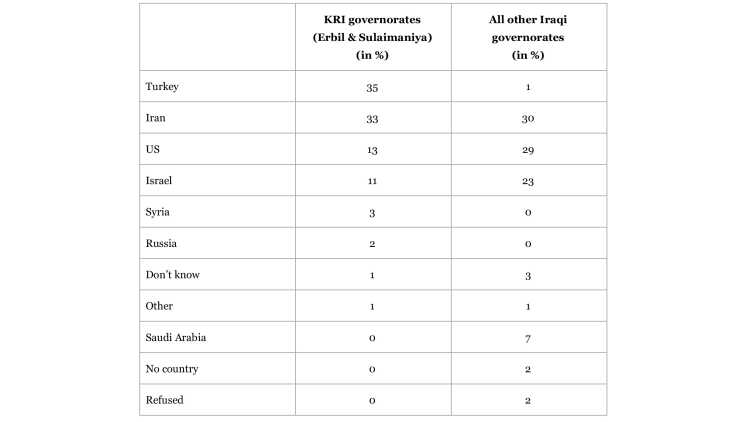
In summary, and based on the experiences from northern Iraq, where distancing from the PKK and appeasing Turkey has not helped to achieve peace and autonomy for Kurdish communities – whether in the past or the present – there is no reason to believe it might help in Syria in the future. Today, Turkish military operations are spreading widely across Turkey, Iraq, and Syria, and Ankara is quite literally testing its military boundaries as it stretches towards North Africa and the Caucasus. As history has shown, the conflict cannot be resolved by military means alone. The PKK is one of the biggest armed Kurdish groups ever and, by definition, a guerrilla army: Turkey has struggled for more than 36 years to defeat it. As long as there is no political resolution to this transnational conflict, the vicious circle of conflict, radicalisation, and further armed mobilisation will continue. It is therefore not without reason that the PKK is still managing to recruit new fighters in the mountainous regions between Turkey, Syria, and Iraq that are still the most heavily contested.
As for a post-war order in Syria, there is no reason to believe that a solution to the political deadlock of AANES lies exclusively in the hands of the SDF. On the contrary, lasting peace in northeastern Syria is closely linked to the overall conflict between Turkey and the PKK. The example of the KRI shows that past efforts by US mediations to simply fulfil Turkish demands while pressuring Kurdish parties to act as proxies were not able to solve some of the real issues on the ground. The major difference between the 1990s and today is that the conflict’s repercussions today exceed the actual Kurdish question, because it has become an integral part of many issues ongoing in the region, not least the war against ISIS. A US administration that repeats some of the mistakes of the late 1990s would not only threaten additional Kurdish civilian lives but also put at risk the very successes of six years of successful combat against ISIS.
Biden’s New Cabinet
As the new US president was inaugurated on 20 January and members of the administration have taken office, it is worth looking at the president’s choices with regard to some of the relevant positions in his cabinet. With Antony Blinken, Lloyd Austin, and Brett McGurk, Biden has chosen three policymakers with extensive experience in the region whose past statements and deployments indicate that US policy will undergo a substantial modification as far as Turkey and the role of Kurds in Syria is concerned.
Joe Biden has selected 58-year-old diplomat Antony Blinken as secretary of state. During the Obama administration, Blinken was first deputy assistant to the president and national security advisor to the vice president, and later served as deputy secretary of state. He has advocated the US approach described above of trying to please Turkey while using the Kurdish on-the-ground forces to fight ISIS. The multilateralist commented on the war against ISIS in a New York Times article in 2017 titled “To Defeat ISIS, Arm the Syrian Kurds” (Blinken, 2017) – at the time, Raqqa was still under ISIS control: “The S.D.F. can succeed only if it is armed to overcome the Islamic State’s ferocious urban resistance,” he wrote, going on to advise Trump’s administration that “any support we provide the Syrian Democratic Forces should be mission-specific — just enough to do the job in Raqqa, not enough to risk spillover to the P.K.K.” (Blinken 2017). Blinken has often advocated that a policy of concessions would calm NATO partner Turkey in northern Syria.
Biden's secretary of defence, Lloyd J. Austin, is known to have been much more critical than Blinken of US foreign policies under former president Obama and to not be much of an interventionist (Perry 2020). Nevertheless, much is to be discovered about the former general, who generally avoids talking to the press. What is known is that he headed the withdrawal of troops from Iraq in 2011, while being opposed to how it was implemented. Austin is also the mind behind the international coalition against ISIS, which is one of the main reasons given by Biden as to why he chose him (Biden 2020). Austin, in that capacity, was one of the first members of the US military to have coordinated with the SDF, which he did when he was commander of the United States Central Command (CENTCOM) from 2013 to 2016. Having crafted the strategy against ISIS from its very inception, when the organisation’s advance shocked the whole world, he knows that the gains made against ISIS can be lost quickly. His understanding of the importance of Kurdish forces for the defeat of ISIS might be of crucial importance for a modified US policy.
Another selection of high relevance is that of Brett McGurk. The former special presidential envoy for the Global Coalition to Counter ISIL is known to be a strong opponent of Turkish expansionism in northeastern Syria. He even resigned from his previous position in late 2018 in protest of Trump’s initial order to withdraw ground troops from eastern Syria (Harb and Ragip 2021). Joe Biden’s choice of McGurk to be the Middle East and North Africa coordinator of the National Security Council sends a strong signal to Turkey. There is hardly any other figure in US diplomacy who has established as strong links to both the Kurdish authorities in the KRI and AANES as McGurk has. Because of that, he is widely respected across the region, especially among Kurdish actors. Unsurprisingly, the nomination caused a great uproar in Turkish media, various outlets having even accused him of being a PKK supporter, as Turkish foreign minister Mevlüt Çavuşoğlu initially did in 2017 (Harb and Ragip 2021).
The loudest voice of criticism towards Turkey in the new administration comes arguably from the new president himself. In a New York Times interview from January 2020, Biden talked again about making Erdoğan pay, as he had in Iowa in 2019. He specifically pointed to Turkey’s treatment of the Kurds not only on foreign territory but also domestically, and stated that he wants to “[make] it clear that we are in a position where we have a way which was working for a while to integrate the Kurdish population who wanted to participate in the process in their parliament […]. He [Erdoğan] has to pay a price. He has to pay a price for whether or not we’re going to continue to sell certain weapons to him” (The Editorial Board of NYT 2020). Unlike Blinken, Biden has an eye on anti-democratic developments in Turkish domestic policies after the attempted coup of 2016, stating, “He [Erdoğan] got blown out. He got blown out in Istanbul, he got blown out in his party. So, what do we do now? We just sit there and yielded. And the last thing I would’ve done is yielded to him concerning the Kurds. The absolute last thing” (The Editorial Board of NYT 2020).
The Future of US and EU Policies
All three of these Biden appointees previously served in the Obama administration. Therefore, one central question during the upcoming months will be whether the Biden administration will simply continue the approach of Barack Obama. The former president was known for wanting to end “forever wars” and to retreat from the Middle East, but the discussion might be different now. It might revolve around the question of how to not only withdraw forces but actively resolve and therefore end conflict. The Obama doctrine was characterised by delegating active involvement either to the drone war or to governments that were considered to bring some stability if appeased enough. That calculation did not work out, especially in the Turkish case. Multilateralism has no effect when the interdependence built between states creates an inability to effectively counter anti-democratic and expansionist developments, as is the case with Turkey now.
At least since 2019, there has been very little US opposition to the increasing number of Turkish interventions in Libya and the Eastern Mediterranean, its unilateral and sudden moves, and its repeated ethnically motivated attacks on Kurdish areas in Syria and Iraq. Especially the latter has come at great human cost but has also meant strategic and military loss in the war against ISIS. Eventually, a solution for post-ISIS Syria that enables stability and lasting peace depends on the political status of the AANES. That cannot be achieved without mediating peace talks between Turkey and the PKK, as this decades-old contestation (and with it, the Kurdish question within Turkey) is at the very root of today’s conflicts between Kurds in Iraq and Syria and the Turkish military.
To make a really substantial move, two steps are essential: First, official multilateral peace talks between the Turkish government and the PKK should be initiated, in which the US and the EU take part. Second, a roadmap for Kurdish self-rule should be designed that transcends the phony debate of dependence vs. independence and looks at the greater issue of real institution-building within the Kurdish areas in Syria and Iraq by creating accountable and representative political institutions. If Biden wants to bring the United States back into global politics and Middle Eastern affairs, initiating a discussion about the type of political framework into which the AANES can be embedded within a post-war order in Syria could be a valuable entry point. This discussion, however, cannot be held without bringing Turkey back into the process, ideally by holding peace talks directly with the PKK. If such talks succeed and an internationally recognised political status for the Kurds in Syria can be negotiated, the US will manage to powerfully stabilise its strongest bulwark against the resurgence of ISIS in the region.
A clear US take on Turkey can also enable the EU to act more strongly and more coherently vis-à-vis Turkey in other contexts, such as in the Eastern Mediterranean, Libya, and Armenia. It is time for the EU, especially Germany, to reconsider its present relationship with Turkey. Neither are negotiations on EU admission ongoing, nor are there clear plans to sanction Turkey. This political limbo cannot go on endlessly – it just encourages Turkey to keep testing its limits. Further, Germany should try to dampen the power the Turkish state has in Germany, specifically against political dissidents and oppositional figures who have sought refuge there. Much of Germany’s reluctance is rooted in its awareness of this condition. Turkish state networks in Germany should be dismantled to allow for both the safety of Turkey critics in Germany and a foreign policy that does not bend to Ankara’s influence.
Footnotes
References
Arab Barometer (2019), Survey Data on Iraq from AB Wave V (2018–2019), www.arabbarometer.org/survey-data/ (28 December 2020).
Balanche, Fabrice (2020), The Fragile Status Quo in Northeast Syria, www.washingtoninstitute.org/policy-analysis/fragile-status-quo-northeast-syria (28 December 2020).
Biden, Joe (2020), Why I Chose Lloyd Austin as Secretary of Defense, www.theatlantic.com/ideas/archive/2020/12/secretary-defense/617330/ (2 January 2021).
Biden, Joe (2019), Campaign 2020 Joe Biden in Davenport, Iowa, www.c-span.org/video/?465286-1/joe-biden-campaigns-davenport-iowa (2 January 2021).
Blinken, Antony J. (2017), To Defeat ISIS, Arm the Syrian Kurds, www.nytimes.com/2017/01/31/opinion/to-defeat-isis-arm-the-syrian-kurds.html (15 December 2020).
Crisis Group (2020), Turkey’s PKK Conflict: A Visual Explainer, www.crisisgroup.org/content/turkeys-pkk-conflict-visual-explainer (15 December 2020).
Harb, Ali, and Ragip Soylu (2021), Biden Appoints Staunch Turkey Critic Brett McGurk to National Security Council, www.middleeasteye.net/news/biden-appoints-staunch-turkey-critic-brett-mcgurk-national-security-council (9 January 2021).
Khalifa, Dareen (2020), The SDF Seeks a Path Toward Durable Stability in North East Syria, www.crisisgroup.org/middle-east-north-africa/eastern-mediterranean/syria/sdf-seeks-path-toward-durable-stability-north-east-syria (30 November 2020).
Kirkpatrick, David D., and Eric Lipton (2019), Behind Trump’s Dealings with Turkey: Sons-in-Law Married to Power, www.nytimes.com/2019/11/12/us/politics/trump-erdogan-family-turkey.html?auth=login-email&login=email (29 December 2020).
Kurdistan Times (2021), دۆکیومێنت: وەزارەتی بەرگریی تورکیا “تەگبیری شەڕی پەکەکە و حکومەتی هەرێم” دەکات (Documents: Ministry of Defence of Turkey announces “planning for war between KRI and PKK” ), https://kurdistantimes.org/2021/01/24/%d8%af%db%86%da%a9%db%8c%d9%88%d9%85%db%8e%d9%86%d8%aa-%d9%88%db%95%d8%b2%d8%a7%d8%b1%db%95%d8%aa%db%8c-%d8%a8%db%95%d8%b1%da%af%d8%b1%db%8c%db%8c-%d8%aa%d9%88%d8%b1%da%a9%db%8c%d8%a7-%d8%aa%db%95/ (24 January 2021).
O’Donnell, Sean W., Matthew S. Klimow, and Ann Calvaresi Barr (2020), Operation Inherent Resolve. Lead Inspector General Report to the United States Congress, https://media.defense.gov/2020/Nov/03/2002528608/-1/-1/1/LEAD%20INSPECTOR%20GENERAL%20FOR%20OPERATION%20INHERENT%20RESOLVE.PDF (2 January 2021).
Perry, Mark (2020), Lloyd Austin Isn’t Who You Think He Is, https://foreignpolicy.com/2020/12/16/lloyd-austin-isnt-who-you-think-he-is/ (2 January 2021).
Raleigh, Clionadh et al. (2010), Introducing ACLED – Armed Conflict Location and Event Data, in: Journal of Peace Research, 47, 5, 651–660.
The Editorial Board of NYT (2020), Joe Biden. Former Vice President of the United States, www.nytimes.com/interactive/2020/01/17/opinion/joe-biden-nytimes-interview.html (2 January 2021).
General Editor GIGA Focus
Editor GIGA Focus Middle East
Editorial Department GIGA Focus Middle East
Regional Institutes
Research Programmes
How to cite this article
Jasim, Dastan (2021), Biden’s Challenge: Kurdish Autonomy and Turkish Expansionism, GIGA Focus Middle East, 1, Hamburg: German Institute for Global and Area Studies (GIGA), https://nbn-resolving.org/urn:nbn:de:0168-ssoar-71421-8
Imprint
The GIGA Focus is an Open Access publication and can be read on the Internet and downloaded free of charge at www.giga-hamburg.de/en/publications/giga-focus. According to the conditions of the Creative-Commons license Attribution-No Derivative Works 3.0, this publication may be freely duplicated, circulated, and made accessible to the public. The particular conditions include the correct indication of the initial publication as GIGA Focus and no changes in or abbreviation of texts.
The German Institute for Global and Area Studies (GIGA) – Leibniz-Institut für Globale und Regionale Studien in Hamburg publishes the Focus series on Africa, Asia, Latin America, the Middle East and global issues. The GIGA Focus is edited and published by the GIGA. The views and opinions expressed are solely those of the authors and do not necessarily reflect those of the institute. Authors alone are responsible for the content of their articles. GIGA and the authors cannot be held liable for any errors and omissions, or for any consequences arising from the use of the information provided.













